- Home
- Fyodor Dostoyevsky
Poor Folk and Other Stories Page 2
Poor Folk and Other Stories Read online
Page 2
All this he said to me on that occasion. All this he later said to many other people besides, people who are still alive now and are able to bear testimony that it was so. I left his house in a state of intoxication. I stopped at the corner, looked up at the sky, at the bright day, at the people going past, and felt with my entire being that a solemn moment had occurred in my life, that my life had been subjected to a change of fortune that would affect it for ever, that something entirely new had begun, but such a thing as I had not envisioned even in my wildest dreams. (I was a terrible dreamer in those days.) ‘Am I really so great?’ I wondered in embarrassment and a kind of timid ecstasy. Oh, don’t laugh, never again did I think I was great, but then – how could I endure what I had been told? ‘Oh, I will be worthy of these praises, and what men, what men!’ I thought. ‘There are men for you! I shall endeavour to earn their praise, I shall make every effort to become as noble as they are, I will be “loyal”! Oh, how frivolous I am! If Belinsky only knew what worthless, shameful things there are in me! Yet people still say that these littérateurs are proud and vainglorious. While the fact is that these men are to be found only in Russia, they are alone, but they, they alone possess the truth, and truth and goodness will always be victorious and triumphant over sin and evil, we shall prevail; Oh, let us go to them, with them!’
All these things passed through my mind; I remember that moment with the fullest clarity. And never subsequently have I been able to forget it. It was the most heavenly moment in my whole life. When I was serving my term of penal servitude, the mere recollection of it was enough to keep my spirits up. Even now I remember it each time with ecstasy.
The rest of the story surrounding Poor Folk and the beginning of Dostoyevsky’s career as a professional writer has been told by his biographers, and is too well-known to need recounting. Suffice it to say that Belinsky was mistaken in supposing the young writer to be an artistic mouthpiece for his own social and political views. For a time, while he enjoyed Belinsky’s support, Dostoyevsky indulged in a bout of euphoric joy at his own success. This euphoria, which at times bordered on the manic, gave rise to some rather odd letters written to Mikhail. One, dated 16 November 1845, contains the following passage:
Really, brother, I do not think my fame will ever again reach such an apogee as it has now attained. On all sides I am accorded incredible respect, there is a fearful amount of curiosity about me. I have made the acquaintance of a vast number of the most honoured members of the establishment. Prince Odoyevsky has asked me to favour him with a visit, while Count Sollogub is tearing his hair out in despair. Panayev told him that a talent had appeared which would trample them all into the mire. Sollogub went running to visit everyone and, dropping in on Krayevsky, suddenly asked him: ‘Who is this Dostoyevsky? Where can I get hold of Dostoyevsky?’ Krayevsky, who never minces his words or spares anyone’s feelings, told him in reply that ‘Dostoyevsky does not wish to do you the honour of favouring you with a visit.’ It really is so: the miserable little aristocrat has now mounted his high horse and thinks he can crush me with the lavishness of his flattery. Everyone receives me as though I were a living wonder. I cannot even open my mouth without it being repeated in every corner that Dostoyevsky said this, Dostoyevsky is going to do that. Belinsky loves me as his very own son…
When Poor Folk was finally published in the St Petersburg Almanac for January 1846, its reception by the critics was far less positive than might have been expected after the furore of interest and publicity that had been whipped up by Belinsky’s sudden enthusiasm. To make matters worse, The Double, the ‘St Petersburg Poem’ that constituted Dostoyevsky’s second major prose work, also received adverse reviews – though Belinsky praised both works in his Notes of the Fatherland article. The contrast between the initial sense of triumph and the bitter disillusionment that followed set the key for the whole of the writer’s torn and conflict-ridden biography. Likewise, Poor Folk itself, far from being the impassioned outpouring on the theme of social evils which many contemporary critics believed it to represent, was the cornerstone of Dostoyevsky’s fictional art, a carefully wrought narrative work which both displays its roots in European fiction (the epistolary novel of Smollett, Rousseau and Goethe, the drame dialogué of Walter Scott, the moral-social universe of Balzac) and points forward to the peculiarly Russian works of the author’s maturity.
Of the other prose pieces included in the present volume, The Landlady (1847) reflects Dostoyevsky’s lifelong love of the novellas of the German romantic writer E. T. A. Hoffmann, and also anticipates Annensky, Blok and the ‘Silver Age’ of Russian poetry (many Symbolist poets were influenced by the tale), while Mr Prokharchin (1846) and Polzunkov (1847) show the author striving for a narrative compression to equal that of the short stories of Pushkin – though with vastly different artistic means. In these extraordinary and terrifying character sketches, where the very texture of existence itself is called into question, we look forward not only to the monologues of Marmeladov and Svidrigailov, but also to the short stories of Kafka. Dostoyevsky was seldom as’modern’ as he is here.
NOTE ON THE TEXT
The text used for the present translation is identical with that contained in F. M. Dostoyevsky, Polnoye sobranie sochineniy v tridtsati tomakh (Editions, Journalistic Writings, Letters and Notebooks), 30 vols, Izdatel’stvo “Nauka”, Leningrad, the first four volumes of which were published in 1972.
POOR FOLK
A NOVEL
Oh, those storytellers! They can’t rest content with writing something useful, agreeable, palatable – they have to dig up all the earth’s most cherished secrets!… I’d forbid them to write, that’s what I’d do! I mean, have you ever known the like? A man reads… and finds himself reflecting – and before he knows where he is, all kinds of rubbish come into his head. I’d forbid them to write, truly I would; forbid them to write altogether!*
Prince V. F. Odoyevsky
April 8
My precious Varvara Alekseyevna.
Yesterday I was happy – inordinately, impossibly happy! For once in your life, you stubborn girl, you have done as I asked. In the evening, at about eight, I woke up (you know, little mother, how I like to sleep for an hour or two after the completion of my duties). I had found a candle and some paper, and was sharpening my pen, when suddenly I happened to raise my eyes – and I will tell you that my heart fairly gave a leap! So you had guessed, after all, what it was my poor heart desired! I saw that one tiny corner of the curtain at your window had been pulled up and hitched onto the pot of balsams, precisely, oh, precisely in the way I had hinted you might do it when we met that time; I at once fancied that I saw your little face at the window for a moment, that you were looking down at me from your little room, that you were thinking about me. And oh, my little dove, how disappointed I was when I simply could not discern your charming little face properly! There was a time, little mother, when I, too, had good eyesight. Age is no joke, my darling! Even now my eyes seem to swim all the time; you do a bit of work of an evening, write a bit, and the next morning your eyes are all red, with the tears streaming down your face so you’re ashamed to be seen by strangers. But anyway, in my imagination your smile fairly shone, my little angel – your kind, affectionate little smile and in my heart I had exactly the same sensation as that time I kissed you, Varenka, do you remember, my little angel? Do you know, my little dove, I even fancied that I saw you wag your finger at me up there! Did you, you mischievous girl? Please give me a detailed account of all this in your letter without fail. Well, what do you think of our little arrangement concerning your curtain, Varenka? It’s charming, don’t you think? Whatever I am doing – sitting at work, going to bed or waking up, I know that you are up there thinking about me, remembering me, and are yourself well and in good spirits. If you’ve lowered the curtain, that means: ‘Good night, Makar Alekseyevich, it’s bedtime!’ If you’ve raised it, that means: ‘Good morning, Makar Alekseyevich, did you sleep well?’ or ‘How a
re you today, Makar Alekseyevich? As for myself, thanks be to the Creator, I am well and happy!’ Do you see, my little darling, what a skilful arrangement this is? You don’t even need to write me letters! It’s clever, isn’t it? And what’s more it was my idea. I’m rather good at these things, Varvara Alekseyevna, don’t you agree?
I am able to report to you, Varvara Alekseyevna, my little mother, that last night, contrary to expectation, I slept in regular order and am accordingly most satisfied; it is always difficult to sleep in new lodgings one has just moved into; there is always something that is not quite right. I rose this morning as fresh as a daisy – happy and cheerful! What a wonderful morning it was, my dear. Our window had been opened; the sun was shining, the birds were chirruping, the scents of spring were wafting on the air, and all nature was wakening to life – well, and everything else was likewise in corresponding manner; everything was in order, spring-fashion. I even had some rather nice dreams today, and they were all about you, Varenka. I compared you to a bird of the air, made for the delight of human beings and as an ornament for nature. It suddenly occurred to me, Varenka, that we human beings who live in care and trouble ought to envy the carefree and innocent happiness of the birds of the air – well, and so on, and so forth; i.e., I continued to make similar far-fetched comparisons. I have a book here, Varenka, which says the same sort of thing – all described in the greatest detail. I am writing this to you, little mother, because I have so many different dreams. And also because it’s spring now: one’s thoughts are pleasant, witty, fanciful, and one has such tender dreams; everything bears a rosy tinge. That’s why I’ve written all this; though in fact I got it all out of my book. There the author displays the same desire in verses, and writes:
Why am I not a bird, a bird of prey?
Well, and so on, etcetera. There are various other thoughts in it, but God go with them. Now tell me, where were you going to this morning, Varvara Alekseyevna? I had not yet set off for the office, yet there you were, just like a bird in springtime, fluttering out of your room and across the yard, so small and sprightly. How happy it made me to see you! Oh, Varenka, Varenka, you mustn’t be sad; tears will not help your sorrow; I know this, my little mother, I know it by experience. You are comfortable now, and your health has improved a little. Well, how is your Fedora? Oh, what a kindly woman she is! Will you write to me, Varenka, and tell me how you are getting along with her now and whether you are happy with everything? It’s true that Fedora’s a bit grumpy sometimes; but don’t you pay any attention to that, Varenka. God be with her! She’s such a kind one.
I have already written to you about the Teresa we have here – also a kind and reliable woman. And there was I getting so worried about our letters. How would they ever be delivered? And then, to our good fortune, the Lord sent us Teresa. She is a kind, meek, gentle woman. But our landlady is simply without mercy. She wears Teresa out with work as though she were an old rag.
My, what a slum I have landed in, Varvara Alekseyevna! Well, it’s a lodging house! Before I used to live like a real hermit, you remember – peacefully, quietly; you could hear a pin drop. Here, on the other hand, there is nothing but noise, shouting, uproar! But then of course you don’t know how everything is arranged here. Imagine, if you will, a long corridor, utterly dark and filthy. To your right there is a blank wall, and to your left nothing but doors and doors, like numbered hotel rooms, stretching away in a row. Well, these are for rent, and behind each number there is one little room; people live in them in twos or in threes. Don’t expect things to be tidy – it’s a proper Noah’s ark! However, the people seem all right: they’re all educated, learned folk. There’s a civil servant (he works in the literary department somewhere), a well-read man: he talks about Homer, Brambeus,* and various other of those authors of theirs, he talks about everything – a clever man! There are two officers who are forever playing cards. There’s a naval warrant-officer; and an Englishman who’s a teacher. Just wait, and I shall amuse you, little mother; in my next letter I will describe them satirically, i.e. tell you what they are like in every detail. Our landlady is a very small and very dirty old woman – all day long she goes about in her slippers and dressing-gown, and all day long she shouts at Teresa. I live in the kitchen, or rather it would be more correct to put it this way: right next door to the kitchen here there is a room (I should, perhaps, tell you that our kitchen is clean, light and excellently appointed), a small room, a modest little corner… i.e. to put it even better, the kitchen has three windows, and I have a partition that runs parallel with the transverse wall, making as it were another room, a supernumerary one; it is spacious and comfortable, there is a window, and everything – all conveniences, in fact. Well, that is my little corner. So, little mother, don’t you go away with the idea that I’m hiding something and that there’s more to it than what I’ve described; don’t say to yourself: ‘but it’s a kitchen!’ – it’s perfectly true that I live in the kitchen, behind a partition, but that doesn’t matter; I live apart from everyone, so-so, on the quiet. I have provided myself with a bed, a table, a chest of drawers and a couple of chairs, and have hung up an icon. It is true that there are better – possibly even much better – lodgings to be found; but convenience is what matters. And indeed I have done all this for the sake of my own convenience, and you must not think that it has been for any other purpose. Your window is opposite, across the yard; the yard is narrow, and one sees you passing – it is all more cheerful for a hapless fellow like myself, and it’s cheaper, too. The lowliest room in our house here, with board, costs thirty-five paper rubles* a month. That’s more than I can afford! But my place costs me only seven paper rubles, plus five silver rubles for board: that makes a total of twenty-four and a half, whereas before I was paying around thirty, and had to go without a good many things accordingly; I didn’t even drink tea regularly, yet now I save enough to be able to afford both tea and sugar. You know, my darling, it is rather embarrassing not to be able to afford to drink tea; the people here are all well-off, so one feels embarrassed. Varenka, one drinks tea for the sake of others, for form’s sake, in order to keep up appearances; for myself I couldn’t care less, I’m not fussy. Look at it like this: one needs something for ready cash, something for boots and something for clothes – do you think that leaves much over? It all has to come out of my salary. But I don’t complain and am satisfied. It is sufficient. It has been sufficient for several years now; there is also the occasional perk. Well, goodbye, my little angel. I have bought a couple of pots of balsam and a potted geranium at that place – they didn’t cost much. Are you fond of mignonette? They have mignonette, too. Do write and tell me; yes, you know, write as fully as you can. But don’t get any false ideas, little mother, and don’t worry about my having taken a room such as this. I say it again: it was convenience that made me do it, and convenience alone was what tempted me. After all, my dear, I am saving money, I am setting money aside; I have quite a tidy little sum. Don’t get the notion that I am such a meek soul that a fly could knock me over. No, little mother, I’m a bright fellow, and I possess a strength of character fitting in one whose soul is resolute and untroubled. Goodbye, my little angel! I have written you nearly two pages, and I ought to have set off for work long ago. I kiss your fingers, little mother, and remain,
Your most humble servant and most faithful friend,
MAKAR DEVUSHKIN*
PS I ask you only one thing: please reply to me as fully as possible, my angel. With this letter I am sending you a pound of sweets; so eat them to your heart’s content, and for heaven’s sake do not worry about me or bear me any ill-will. Well, so goodbye then, little mother.
April 8
Makar Alekseyevich, Sir,
Do you know that you have at last forced me into a quarrel with you? Upon my word, good Makar Alekseyevich, I find it hard to accept your presents. I know what they cost you, what deprivations and denials to yourself of the very necessities of life they involve. How many times have
I told you that I need nothing, nothing at all; that I have not the wherewithal to repay you for the good deeds with which you have showered me to date. And why these pots of flowers? I mean, the balsams are all right, but why the geranium? I have only to utter one unguarded word, as for example about that geranium, and immediately you go out and buy it; yet I am sure it was expensive, was it not? What wonderful flowers it has! Crimson, like little crosses. Wherever did you get such a pretty geranium? I have put it in the centre of the window, where it may best be seen; I shall put a bench on the floor and place the rest of the flowers on the bench; just wait until I, too, grow rich! Fedora dotes upon them; our room is now like paradise – so clean and bright! But listen – why sweets as well? Indeed, I guessed at once from your letter that all was not quite right with you – all those bits about paradise, and spring, and scents wafting, and birds chirping. What’s this, I thought, it’s poetry, isn’t it? It’s true, you know: all your letter lacks is a little poetry, Makar Alekseyevich! All the rest is there: the tender feelings, the rosy-tinted dreams! About the curtain – Inever gave it any thought; I expect it must have got hitched up of itself when I was moving the pots of flowers; well I never!

 The Eternal Husband
The Eternal Husband Crime and Punishment
Crime and Punishment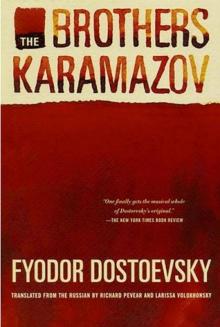 The Brothers Karamazov
The Brothers Karamazov Notes From Underground
Notes From Underground The Idiot
The Idiot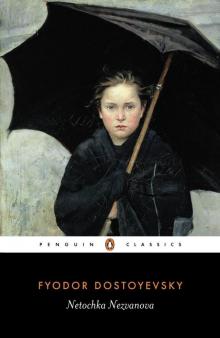 Netochka Nezvanova (Penguin ed.)
Netochka Nezvanova (Penguin ed.)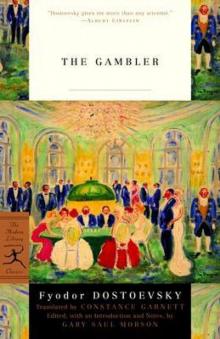 The Gambler
The Gambler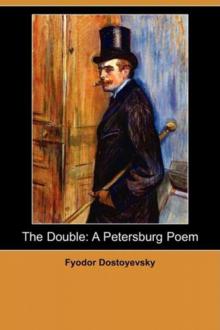 The Double
The Double Poor Folk Anthology
Poor Folk Anthology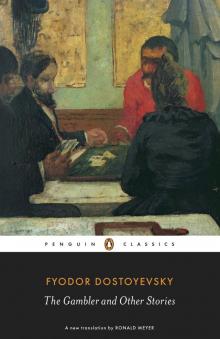 The Gambler and Other Stories (Penguin ed.)
The Gambler and Other Stories (Penguin ed.) Prestuplenie i nakazanie. English
Prestuplenie i nakazanie. English Notes from the Underground
Notes from the Underground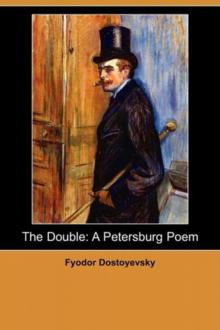 The Double: A Petersburg Poem
The Double: A Petersburg Poem White Nights and Other Stories / The Novels of Fyodor Dostoevsky, Volume X
White Nights and Other Stories / The Novels of Fyodor Dostoevsky, Volume X Complete Works of Fyodor Dostoyevsky
Complete Works of Fyodor Dostoyevsky Poor Folk and Other Stories
Poor Folk and Other Stories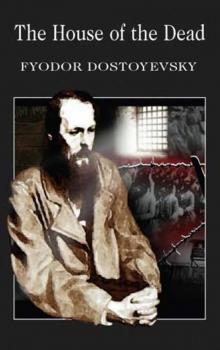 The House of the Dead
The House of the Dead